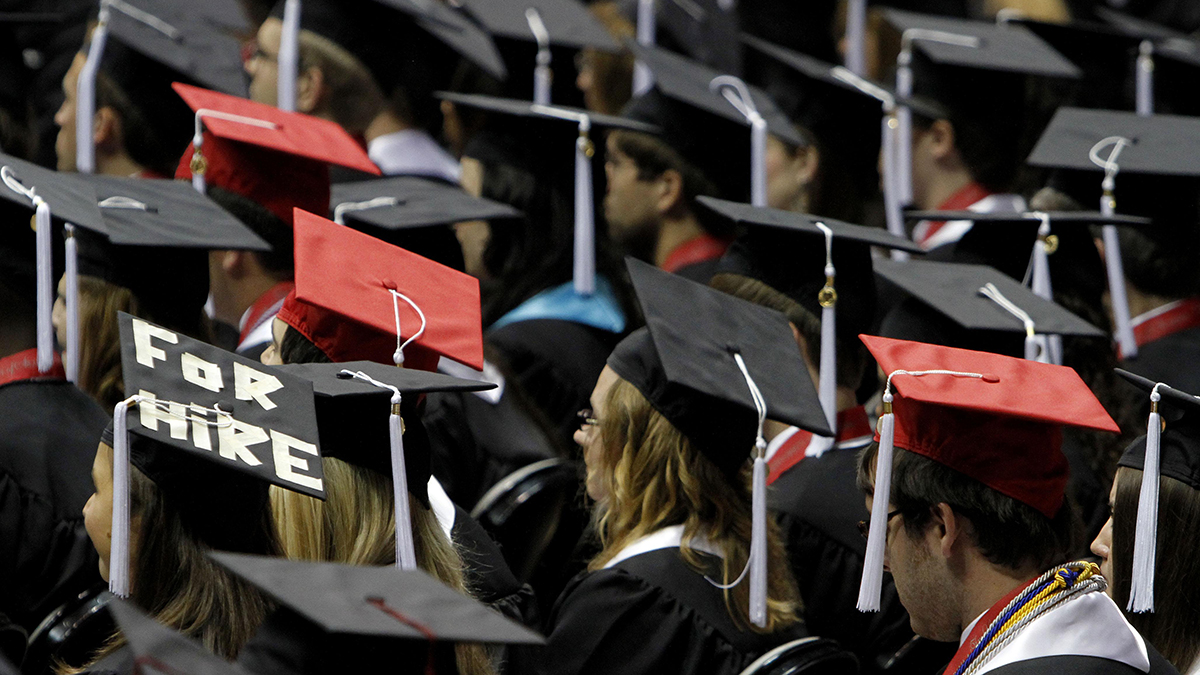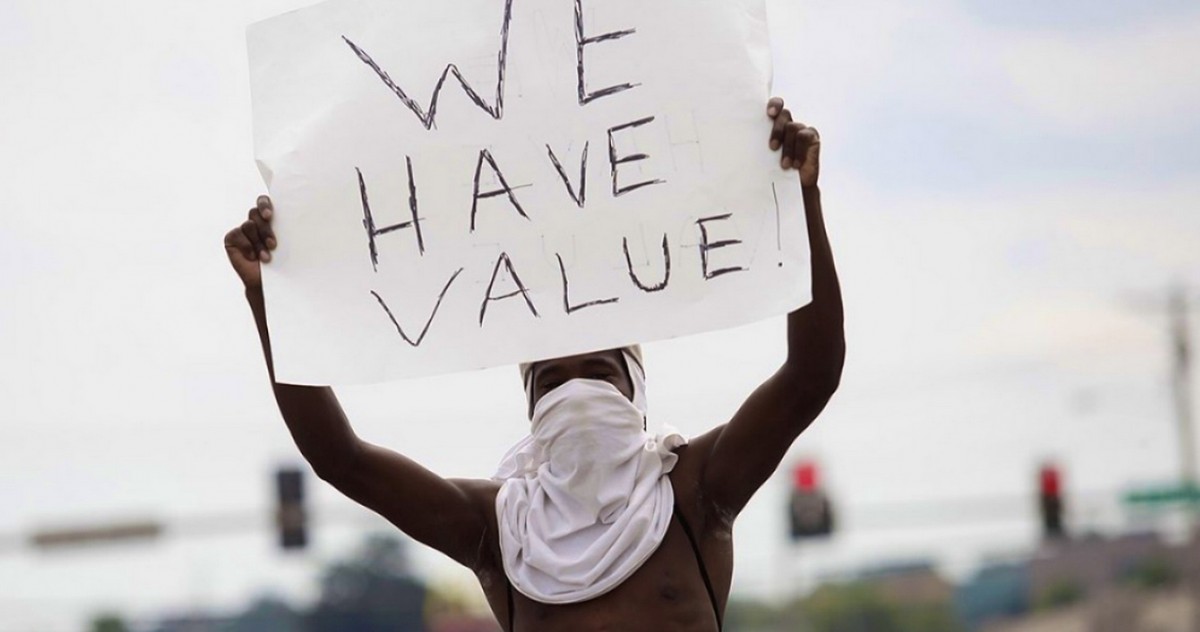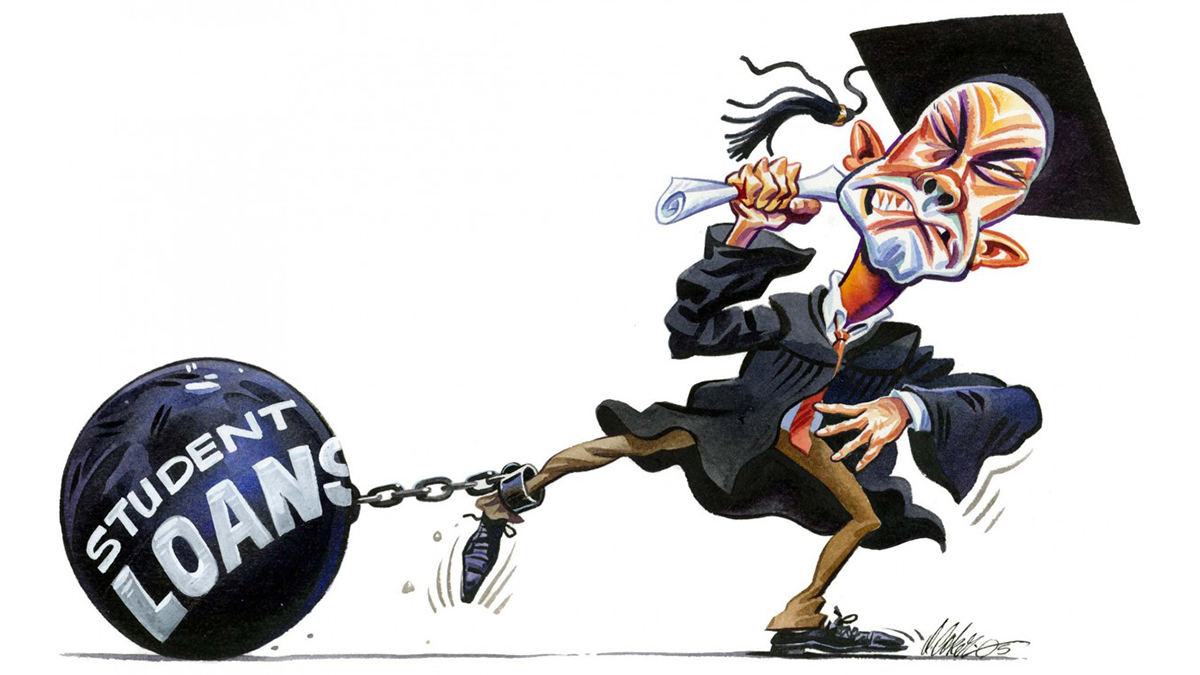
“Work hard and you’ll get ahead” has now become meaningless propaganda. The student loan crisis has proved this once and for all. Until the federal government gets serious about bailing out America’s students and instituting free, public higher education for all who apply, America’s student debtors should refuse to make any further payments.
Student Debt is a Trap
Student debt is no longer just about education – it’s become a trap used to keep poor people from becoming wealthy. And if prolonged, it will lead to massive social and economic instability.
Even though President Obama has hinted that student debt from private lenders may be forgiven, he conveniently left out that 90 percent of student loans are owed to the federal government, which will make approximately $127 billion in profit from student loans over the next decade.
People who aren’t born into bottomless wealth have two options in life: struggle to stay afloat, or move up the class ladder. Those who choose the latter are told that the best way to ensure class mobility is to get a good-paying job, save money, and make smart investments.
To get a good-paying job, a college degree is almost always required to even get a response after applying. And to get that college degree, the average person has to take on approximately $30,000 in debt. When factoring in rising costs of living, steadily-increasing interest rates, plummeting wages, and a volatile job market, making regular payments on such a tremendous amount of debt is almost impossible.
If a student debtor has to default, as one in seven students do within the first three years of required payments, it blemishes their credit rating. Having bad credit can make finding an apartment, buying a car, or even getting a job that much harder. Employers who check credit scores won’t hire a student debtor due to a low credit rating, though they won’t even call an applicant for an interview if the applicant doesn’t meet the education requirements.
So for lots of potential job seekers, the game is rigged. The ones without a degree have their resume thrown in the trash, and the ones who have a degree but a credit score blemished by student loans may get the interview, but tend to get passed in favor of someone with better credit.
Defaulting on student loans can also mean that banks and the government will take big bites out of every piece of income you receive for decades. Student loans can be garnished from paychecks, income tax refunds, and even Social Security checks. Over 150,000 Americans had Social Security checks garnished due to student loans last year, and the U.S. Treasury collected $150 million in student loan payments from Social Security benefits in 2012.
If a student debtor in default happens to live in Montana or Iowa, they can lose their driver’s license. This, in turn, affects their ability to get to work and take their children to daycare, among other things. Some people, like Robert Bowman, were even fired for not making payments on student loans.
The options for our generation are either to get an education and agree to inescapable debt for the rest of our adult lives, or don’t get an education and forgo all possibilities of good-paying, gainful employment.
How Student Debt Became a Trap
Students and recent grads are now getting screwed three ways at once. Young people entering college now are doing so at a time when American student debt is over $1.2 trillion – that’s more than American credit card debt. The student debt bubble is expected to balloon to $2 trillion within the next 7 years.
Unlike credit card debt, student debt can’t be discharged through bankruptcy. Unlike home and car loans where a debtor in default can simply unload their burden by having their car or home repossessed, a student loan debtor can’t return his or her piece of paper. And while you can’t return your piece of paper and can’t discharge your debt through bankruptcy, your credit rating suffers continuously. So what made student debt become the monstrous problem it is today?
For our parents’ generation, a college education was far more accessible. Until the 1980s, the state paid for the bulk of tuition costs, and the remaining costs were able to be paid by simply working a part-time job. Since then, states have consistently slashed higher education budgets by roughly 40 percent, meaning students have to pick up the remainder of the tab with steadily-increasing tuition rates. According to the National Center for Education Statistics, the price for one year of college tuition has risen from an average of $8,438 in 1981 (in 2011-2012 dollars) to an average of $19,339 in 2012, across both public and private institutions.
Also, a college degree wasn’t a requirement for employment like it is today. For our parents’ generation, jobs were plentiful – and you could qualify for most of them with a high school diploma. In the current job market, there is only one job opening for every two job seekers. In 2013, half of college graduates were unemployed or underemployed. And according to a 2014 report by the Federal Reserve Bank of New York, 46 percent of recent college graduates are working in jobs that don’t require a college degree.
The law of supply and demand dictates that because the supply of new jobs is so low, the demand is sky-high, meaning employers can require a higher education benchmark. This has caused degree inflation, leading some to take on even more debt to get a graduate degree and make themselves even more competitive for scarce job openings.
Even in the 1990s and early 2000s, getting a student loan was seen as a safe bet. The interest rates were relatively low, and the job market was booming. The screening process for student loans was tough, and you had to really prove that you needed a loan by providing all the right documents. Even if you were forced to default, you could at least rid yourself of your student debt by declaring bankruptcy. But all that changed in 2005, before the Great Recession, when the Bush administration signed a bill into law that declared student loans would always be your burden, regardless of bankruptcy.
Using Debt to Exploit an Entire Generation for Profit
Once that bill was the law of the land, student loan sharks were everywhere. Banks were at orientation sessions eager to sign naïve 18-year-olds up for student loans. Only the bare essentials were needed to qualify. Student debt later became collateralized and traded on the market for a profit, as investors knew that interest rates and debt amounts would only go up.
According to The Economist, the Carlyle Group (which hosted an investment conference in DC on 9/11 that was attended by both former president George H. Bush and Osama bin Laden’s brother, Shafiq bin Laden) is now looking to buy up student debt collection firms, seeing the insurmountable debt burden faced by American college graduates as a sound investment. The debt burden of America’s future has become a casino game in which the super-wealthy sought to exploit for naked profit.
The NCES also shows that the percentage of students receiving financial aid from 2006 – before student debt became unable to be discharged through bankruptcy – went from as low as 75 percent to as high as 90 percent by 2011-2012. This uptick in student aid correlates directly with the Bush administration’s decision to make student debt permanent for debtors, regardless of bankruptcy. Wall Street is eager to cash in on the misery of student debtors defaulting on their loans.
As the Wall Street Journal reported in 2013, a securities company called SecondMarket is already re-packaging private student debt and older federally-backed student loans to over 100,000 investors, who offload it to other investors to make short-term profits. At least $6 billion of that debt has already been exchanged on the market.
Educational Funding of the South Inc., or EdSouth, and another lender have signed up to use the platform, according to SecondMarket.
Edsouth, which typically buys student loans from other lenders, has used SecondMarket to trade student-loan backed securities in the past, said President and Chief Executive John Arnold. The ability to issue securities piqued his interest, he said: "Any opportunity for capital, you'd have to be looking at."
To sum it up, the original American dream of a good-paying job made possible by a four-year degree has been entirely corrupted. Now, anyone who wants to even try and improve their financial situation through higher education is forced to sign dotted lines that guarantee a life-long agreement of servitude to private banks and the federal government. Our government has fooled a generation with the promise of hard work and payoff, when in reality, they’re colluding with the financial system to shackle young people with insurmountable debt, and meting out punishments for those too poor to pay. The problem will only worsen until we can guarantee free, four-year, public higher education for all, and allow student debt to be discharged.
3 WAYS TO SHOW YOUR SUPPORT
- Log in to post comments




















Comments
disabled and damned replied on
FASFA and states killing the disabled
the state of Missouri from 2002 until late 2012, to my knowledge, was on a push to get as many people who were on social security disability in college as they could. Vocational Rehab told the disabled if they went to school, they would not be subject to annual reviews. It turns out there were no annual reviews, but they did not tell clients that. Voc Rehab was suppose to pay for the education, but after the first year they claimed the state cut the budget, however, urged the disabled to apply for grants and loans , or they would be subject to hard reviews to maintain their disability status . Now many of those disabled who went into debt, but can not get jobs , are having their disability payments garnished and harassed by collections. Some I personally know have been made homeless because of this, some can not buy their needed medication and have slipped into physical mental downfall , a couple have even committed suicide after losing what little they had due to garnished wages. This is even after spending a couple years applying for discharges, deferments and or income based payments. Each request goes unanswered and no help. The only way you find out if your application was even seen is to call them. They will not contact you to tell you anything, except that you owe them and they are taking what little you get in disability payments. But hey! the good part is, Fasfa can claim they are going after those in default. They just dont bother to say its the disabled poor they are doing it too, and not going after those who can actually pay their student loans but wont. How many will Fasfa kill ? What can be done to stop them from doing this ? Do they even care ?